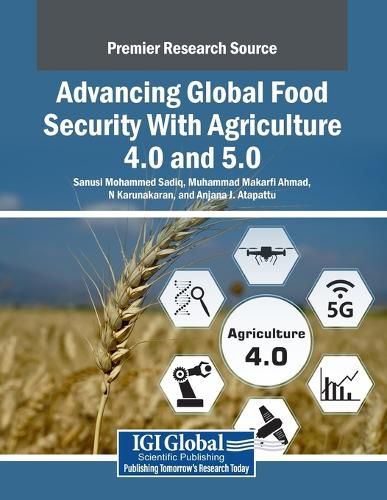Readings Newsletter
Become a Readings Member to make your shopping experience even easier.
Sign in or sign up for free!
You’re not far away from qualifying for FREE standard shipping within Australia
You’ve qualified for FREE standard shipping within Australia
The cart is loading…






This title is printed to order. This book may have been self-published. If so, we cannot guarantee the quality of the content. In the main most books will have gone through the editing process however some may not. We therefore suggest that you be aware of this before ordering this book. If in doubt check either the author or publisher’s details as we are unable to accept any returns unless they are faulty. Please contact us if you have any questions.
Advancing global food security through Agriculture 4.0 and 5.0 represents a shift in the production, distribution, and consumption of food, leveraging the power of cutting-edge technologies to address the challenges of hunger, resource scarcity, and climate change. Agriculture 4.0 has begun to revolutionize farming practices by optimizing crop yields, improving resource management, and enhancing supply chain efficiencies. This technological revolution allows farmers to make data-driven decisions, reduce waste, and increase productivity while minimizing environmental impact. Agriculture 5.0 blends advanced technologies with sustainable practices to foster productivity and social and environmental well-being, creating a more resilient and equitable global food system. Further exploration of these two phases may enhance food security, ensuring access for a growing global population. Advancing Global Food Security With Agriculture 4.0 and 5.0 examines the transformative impact of advanced technologies on agricultural practices and their role in ensuring food security worldwide. It explores the integration of cutting-edge technologies like artificial intelligence, Internet of Things, robotics, and big data analytics into traditional farming methods. This book covers topics such as climate change, farming systems, and livestock management, and is a useful resource for farmers, agriculturalists, climatologists, business owners, academicians, researchers, and scientists.
$9.00 standard shipping within Australia
FREE standard shipping within Australia for orders over $100.00
Express & International shipping calculated at checkout
This title is printed to order. This book may have been self-published. If so, we cannot guarantee the quality of the content. In the main most books will have gone through the editing process however some may not. We therefore suggest that you be aware of this before ordering this book. If in doubt check either the author or publisher’s details as we are unable to accept any returns unless they are faulty. Please contact us if you have any questions.
Advancing global food security through Agriculture 4.0 and 5.0 represents a shift in the production, distribution, and consumption of food, leveraging the power of cutting-edge technologies to address the challenges of hunger, resource scarcity, and climate change. Agriculture 4.0 has begun to revolutionize farming practices by optimizing crop yields, improving resource management, and enhancing supply chain efficiencies. This technological revolution allows farmers to make data-driven decisions, reduce waste, and increase productivity while minimizing environmental impact. Agriculture 5.0 blends advanced technologies with sustainable practices to foster productivity and social and environmental well-being, creating a more resilient and equitable global food system. Further exploration of these two phases may enhance food security, ensuring access for a growing global population. Advancing Global Food Security With Agriculture 4.0 and 5.0 examines the transformative impact of advanced technologies on agricultural practices and their role in ensuring food security worldwide. It explores the integration of cutting-edge technologies like artificial intelligence, Internet of Things, robotics, and big data analytics into traditional farming methods. This book covers topics such as climate change, farming systems, and livestock management, and is a useful resource for farmers, agriculturalists, climatologists, business owners, academicians, researchers, and scientists.